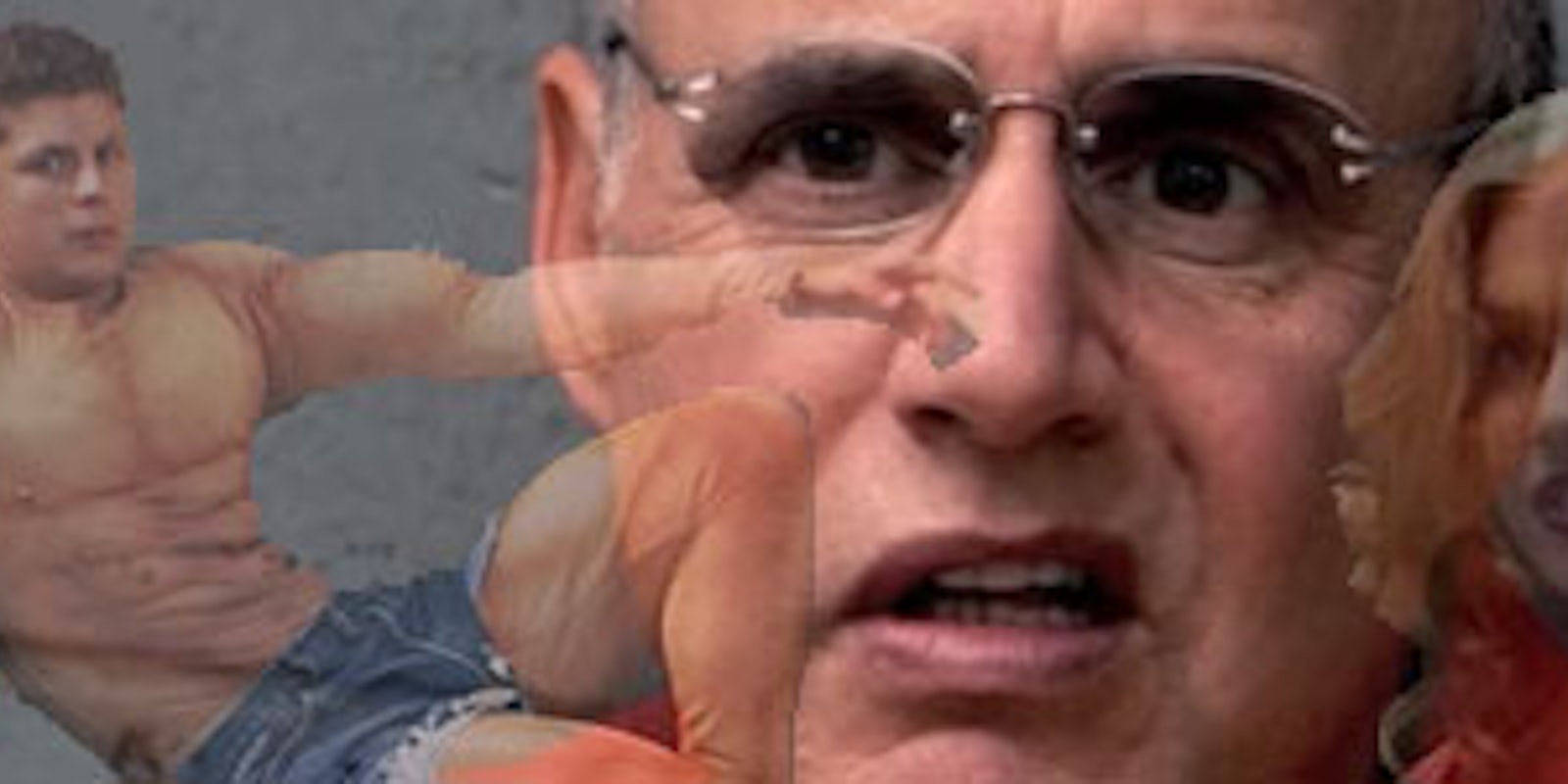
Let’s assume the following about Arrested Development:
Everything from the beginning of the pilot episode till the main act break, when the SEC raids the Bluths’ boat party and arrests George Sr., actually happened.

From there, George Sr. is rightly convicted of treason (for aiding Saddam Hussein, as revealed in later episodes of the show) and receives a death sentence.
George Sr. is held prisoner in the awful conditions afforded to an enemy of the United States who is awaiting execution.
George Sr. is psychologically unprepared for this kind of horror, and suffers a mental breakdown.
From there the rest of Arrested Development is a fantasy George Sr. plays out in his mind fulltime, to avoid facing his own guilt and his own mortality.

Now here’s 10 ways the whole series makes a lot more sense in this scenario:
The characters make self-aware references about being saved by “the Home Builders Organization” (HBO) and other networks, because in George Sr.’s fantasy, everything that’s happening in his mind is a television show. This way he can turn the terror of imminent execution into the minor entertainment news of a TV show’s potential cancellation.
Insanely complex callbacks and references happen throughout the events of the show, which could only be the intricate handiwork of a madman with lots and lots of time on his hands.
Since that complexity is overwhelming, Arrested Development relies on a narrator to justify the action for us. This narrator sounds like Ron Howard, because a man of George Sr.’s generation has seen hundreds of episodes of The Andy Griffith Show and Happy Days, enough to internalize Howard’s voice and make it feel realistic. George Sr. is fully committed to the fantasy, so he never wonders why Arrested Development is Ron Howard’s one and only major gig as a TV narrator, or why someone with an unremarkable voice would get so much voiceover work.
The show pretends every single aspect of American law is a joke, even though American law allows the government to do not-a-joke things like torturing people at black sites without any due process. It makes George Sr. happier to be in a world where the judicial system is easy to beat and his lawyer is the funny guy who played Fonzie (George loooves Happy Days).
The family business never goes completely bankrupt, even though most companies would collapse in this kind of scandal.
Even though George Sr. has been an awful father, and every adult relationship in the family is toxic, every Bluth (in particular Michael) works hard to save the family structure they hate. This could only happen in the fantasy of the patriarch of that family. In reality the Bluths probably scattered shortly after George’s conviction and had to sell the Bluth Company for pennies on the dollar.
George Sr. never liked Tobias, who’s only a part of the family because Lindsay hate-married him. So in George Sr.’s fantasy, Tobias undergoes constant humiliation, has emasculating sexual issues (repressed homosexuality, Nevernude), and can’t achieve intercourse with George Sr.’s beloved daughter.
Lindsay, George Sr.’s beloved daughter, is smoking-hot and flirting with every man she meets, but “can’t seem to give this away.” George Sr. wouldn’t want to imagine her getting intimate with anyone, so she never does.
In George Sr.’s fantasy, George Michael and Maeby are attracted to each other, because he’s an old businessman who doesn’t know other kids and can’t imagine effective alternate romantic partners for them. That’s why the only other prominent kids on the show are the kind George Sr. probably grew up with in a more old-fashioned time (Ann Veal), or one-note jocks (Steve Holt), or the sort of third-world adoptees George Sr. remembers hearing about at charity fundraisers (Annyong). George Sr. also finds a convoluted way to make George Michael and Maeby into non-blood relatives once he realizes he’s pushing them in too incestuous of a direction.
George Sr. creates Oscar Bluth, the most obvious sign that this is all a fantasy. Oscar, George’s twin brother, appears out of nowhere in “Whistler’s Mother”, the twentieth episode of the series. How did we never hear a word about this important family member until 19 other episodes had passed? It’s because Oscar’s an imaginary personification of everything Prisoner George Sr. wishes he had in his life: freedom, hair, youthfulness, innocence (legal and spiritual), a kind spirit, a positive relationship with Michael, the ability to please his wife Lucille (even making love to her on a beach, which is an obvious sexual fantasy), a deeper connection with Buster (as his “true father”, he can potentially counteract Lucille’s influence and turn Buster into a man), a career as an artist, and a life that was never corrupted by money and power. Oscar also functions as a “get out of jail free” card, allowing George Sr. to knock him out and steal his identity multiple times. In George Sr.’s fantasy this fools law enforcement into beating and incarcerating the real Oscar again and again, even though real law enforcement officers would never fall for that trick for a second.

You may find all this truth shocking, but it’s as Ann as the nose on Plain’s face.
By Alex Schmidt



